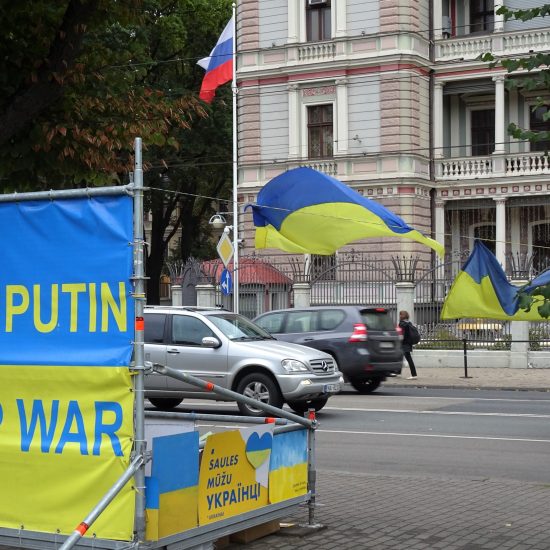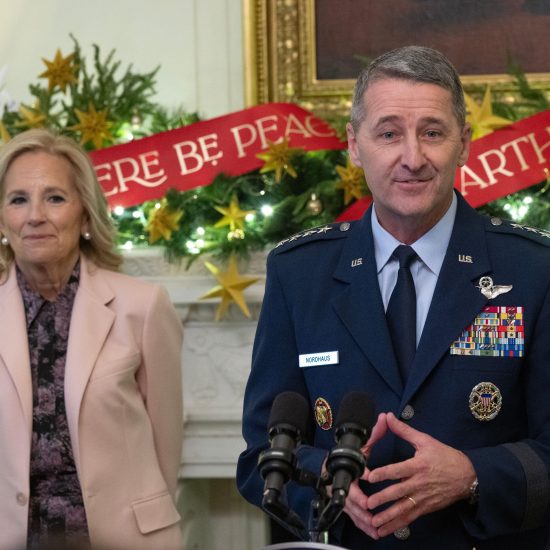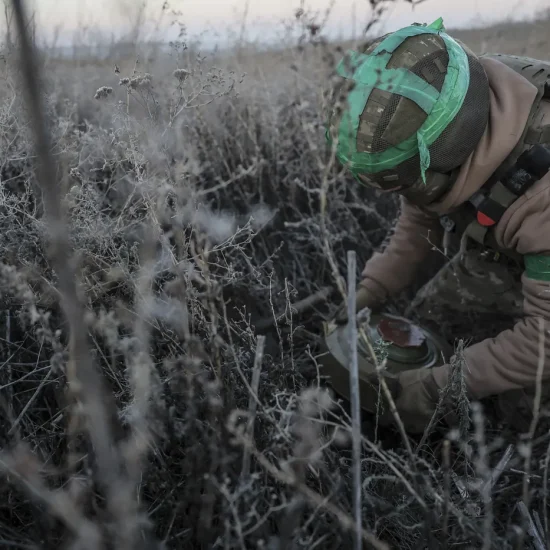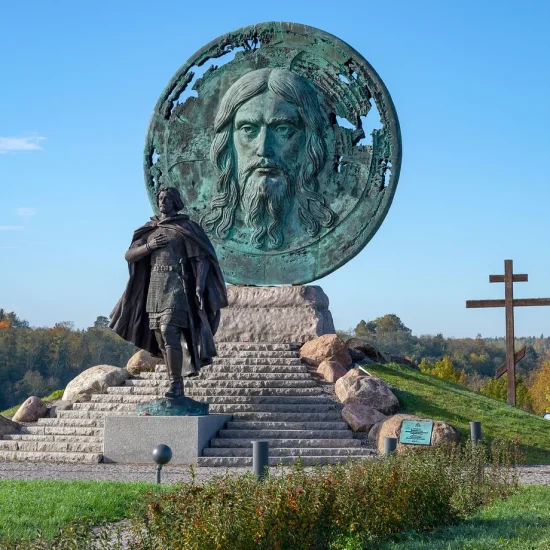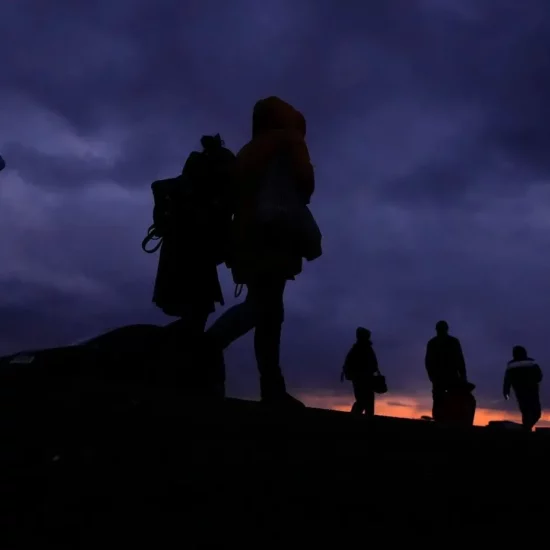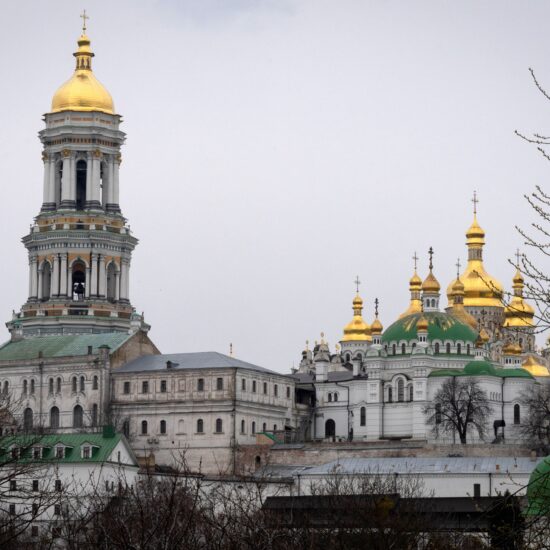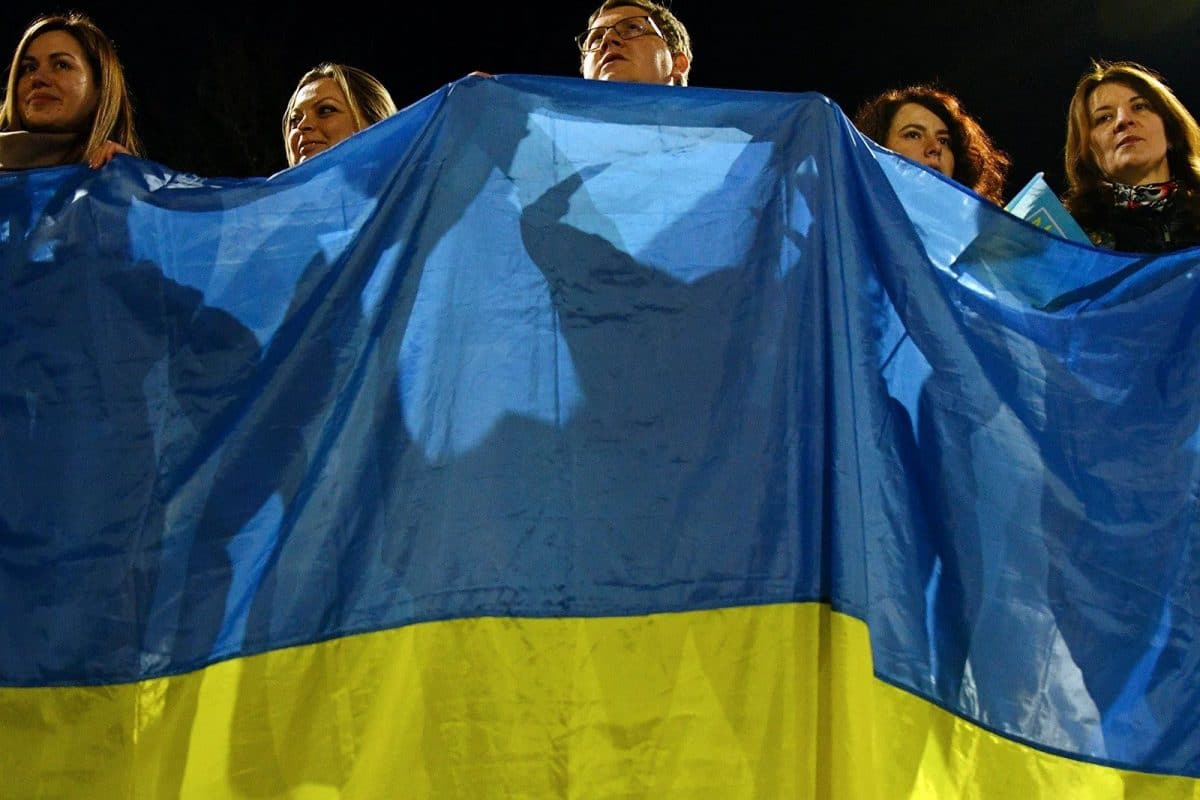
(RNS) — At the top of the website for the Ukrainian Orthodox Church of the USA is a simple, three-word message: “Pray for Ukraine!”
“May God hear our loving petitions and soften the hearts and minds of all, those within and outside Ukraine, during these dangerous times,” wrote the UOC’s Council of Bishops, in a statement responding to news of the Russian invasion this week.
The bishops of the UOC, founded by immigrants, were among a host of religious leaders asking God to intervene on behalf of Ukraine. The prayers asked for an end of hostilities and for the protection of civilians — and in at least once case, for a defeat of Russian forces.
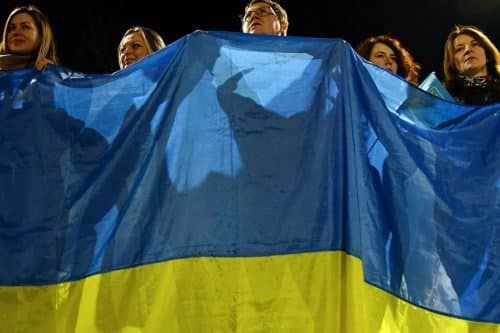
People wave a huge Ukrainian national flag during a rally in Kramatorsk, Ukraine, on Feb. 23, 2022. (Andriy Andriyenko/Associated Press)
“Send your heavenly legions, O Lord, commanded by the patron of Kyiv, Archangel Michael, to crush the desires of the aggressor whose desire is to eradicate our people,” the UOC bishops wrote in an online prayer.
Calls for peace also echoed from the Russian Orthodox Cathedral in Washington, D.C., which planned to hold a prayer for peace Thursday (Feb. 24), according to an announcement on the cathedral’s website. The announcement linked to a “prayer for the cessation of civil strife.”
“Lord Jesus Christ our God, look down with Thy merciful eye upon the sorrow and greatly painful cry of Thy children, abiding in the Ukrainian land,” that prayer read. “Deliver Thy people from civil strife, make to cease the spilling of blood, and turn back the misfortunes set against them.”
The U.S. Conference of Catholic Bishops asked Catholics to fast for peace on Ash Wednesday (Mar. 2). Bishop David J. Malloy of Rockford, chairman of the USCCB Committee on International Justice and Peace also called for a day of prayer.
“In this time of fear and uncertainty, we stand in solidarity with the Church in Ukraine and offer our support,” Malloy said in a statement. “We call on all the faithful and people of good will to pray for the people of Ukraine.”
Faith-based and humanitarian groups expressed concerns of a possible mass exodus of refugees. Along with praying for those affected by the invasion, Krish O’Mara Vignarajah, president of Lutheran Immigration and Refugee Service, called on political leaders to prepare to protect displaced people.
“The humanitarian implications of a full Russian invasion must be a central consideration in the U.S. and international response,” Vignarajah said. “Thousands could lose their lives, and millions more could lose the only home they have ever known. The U.S. and its allies must prepare to respond to the very real possibility of a mass exodus of Ukrainian refugees. Protecting the displaced cannot merely be an afterthought.”
Pax Christi, a Catholic peace organization, encouraged its members to pray and fast and to hold public vigils for peace on Ash Wednesday.
“Pax Christi USA urges the international community to stand united against the invasion of Ukraine and in support of diplomacy and dialogue to bring this crisis to an end,” the group said in a statement.
In the United Kingdom, the archbishops of Canterbury and York issued a joint pastoral letter in response to the invasion, with calls for prayer along with liturgical texts and readings in support of peace. Archbishop Justin Welby and Archbishop Stephen Cottrell invited Anglican church members to make Sunday (Feb. 27) a day of peace and to join the call of Pope Francis for prayers on Ash Wednesday.
“Peace, therefore, is so much more than the absence of war,” they wrote. “It is a gift, and it is also a decision, a gift that must be received. It is a choice we make that shapes the way we live well alongside each other. It characterises our relationship with God. It comes into being by seeking justice.”
Leaders of the United Church of Christ began their prayer, posted online, with a quote from the Book of Proverbs: “There are six things that the Lord hates, seven that are an abomination to him: haughty eyes, a lying tongue, and hands that shed innocent blood, a heart that devises wicked plans, feet that make haste to run to evil, a false witness who breathes out lies, and one who sows discord among brothers.”
“Hear our prayers for all those who will die today because of war in Ukraine and other war-torn countries all over this world. Grant them an end to the suffering of this world and eternal peace that is only found in You,” the UCC officers wrote.
A number of faith leaders took part in an online vigil for peace this week — including Presiding Bishop Michael Curry of the Episcopal Church, Presiding Bishop Elizabeth Eaton of the Evangelical Lutheran Church in America, the Rabbi Jonah Dov Pesner, director of the Religious Action Center of Reform Judaism; and Mohamed Elsanousi, executive director of Religious and Traditional Peacemaker, Religion News Service reported earlier this week.
“The drums of war are beating louder with each passing moment,” said Tarunjit Singh Butalia of Religions for Peace USA during the vigil. “We must stand up as people of faith and people of peace to speak truth to power.”
The World Evangelical Alliance and the European Evangelical Alliance called for an end of hostilities in the Ukraine and withdrawal of all Russian troops.
“We are gravely concerned to yet again witness armed conflict that will inevitably lead to tragic loss of human lives, including innocent civilians who only desire to live in peace,” WEA Secretary General Bishop Thomas Schirrmacher said in a statement. “We call for an end to the hostilities, an immediate ceasefire and respect for Ukrainian territorial integrity.”
The American Friends Service Committee, a Quaker peace organization, urged U.S. leaders and the international community to pursue diplomacy and de-escalation, rather than a military response to the crisis in Ukraine. The group also passed along a message from Quakers in Ukraine calling for peace.
“It is very important for us to convey that Ukrainians are peace-loving people and very kind. In the last two months, when we got together and started our meetings, we agreed that there is no one among us who would see war as the answer, or believe that violence is the way out,” the message read. “We categorically condemn any aggression, expansion, and pressure.”

